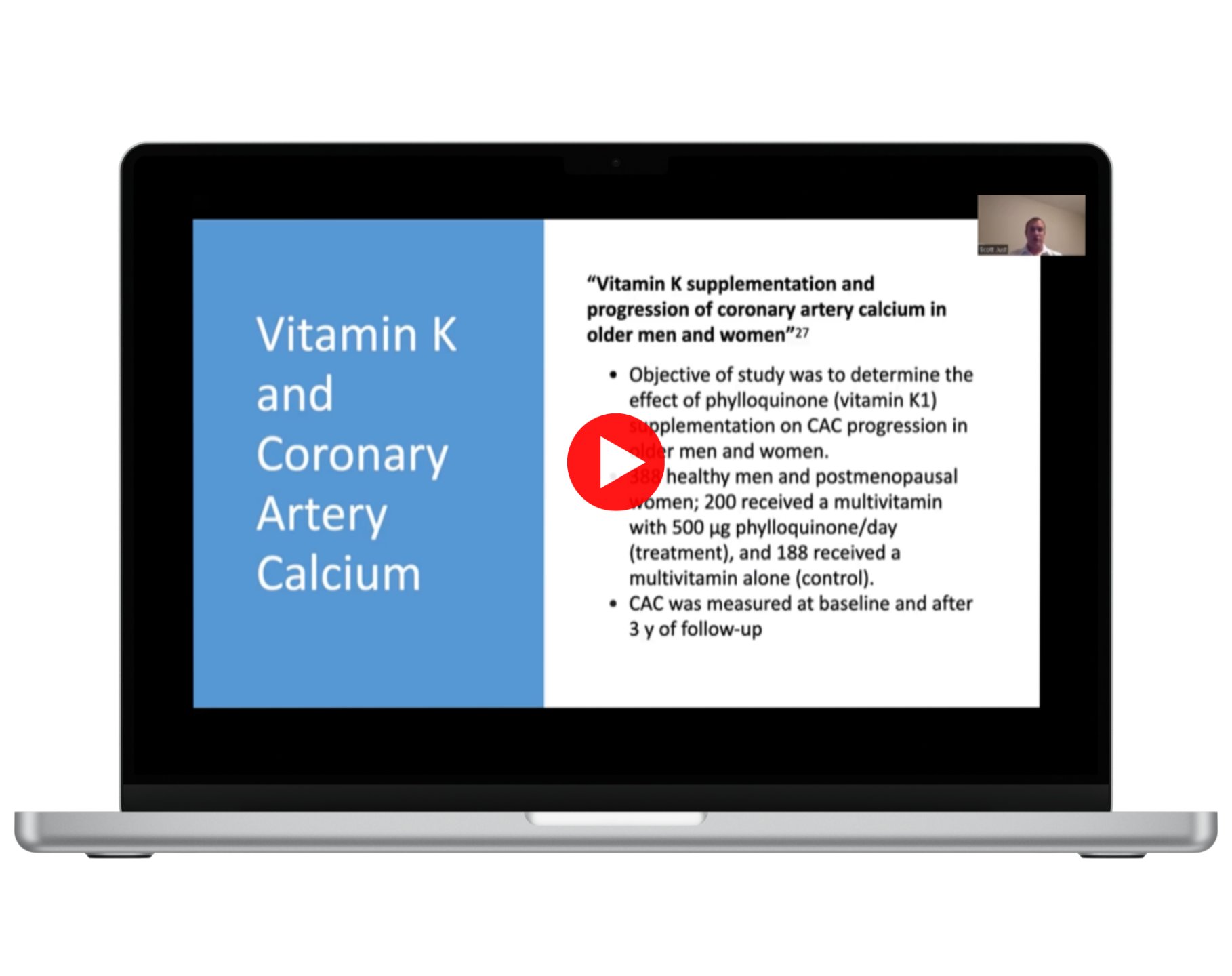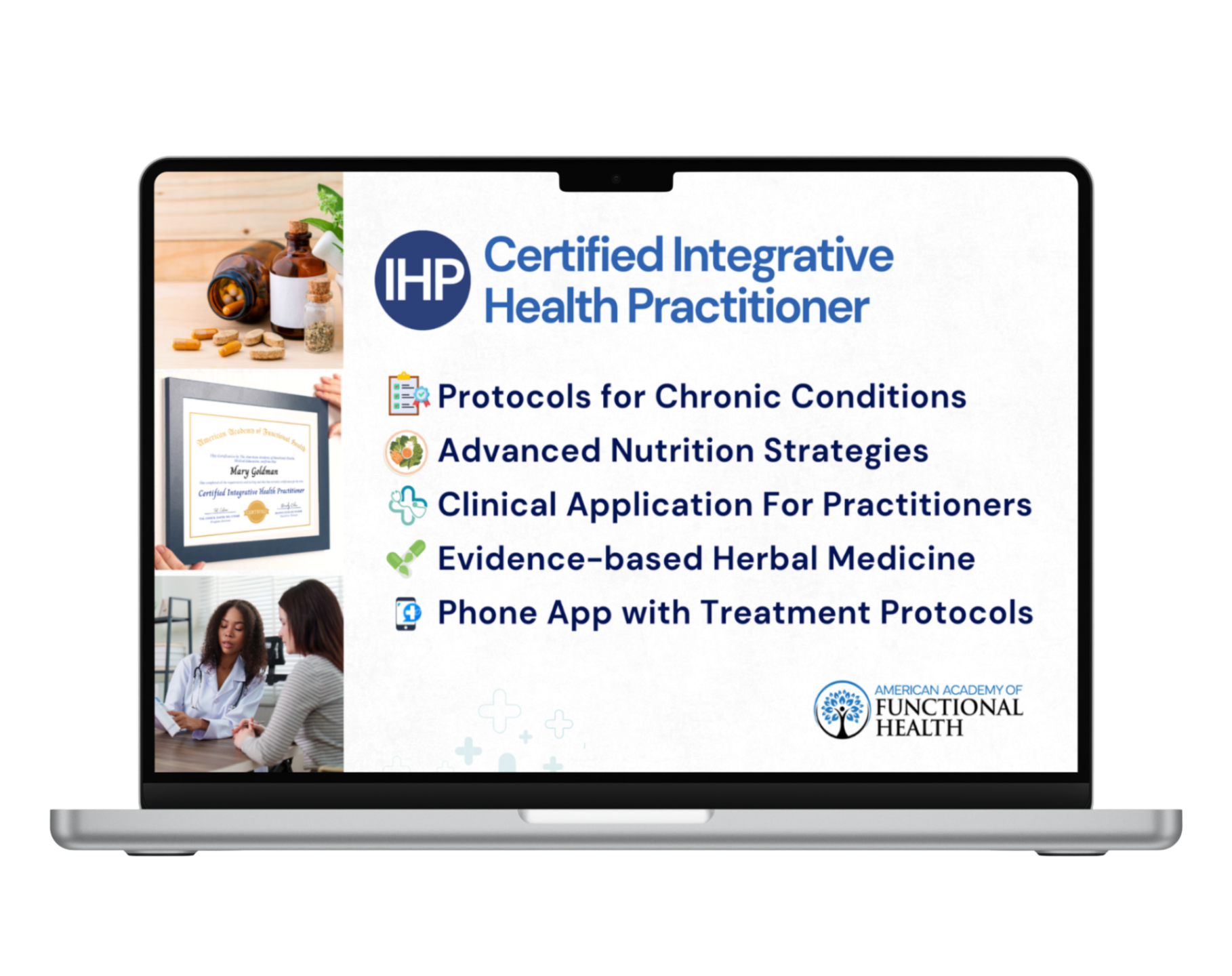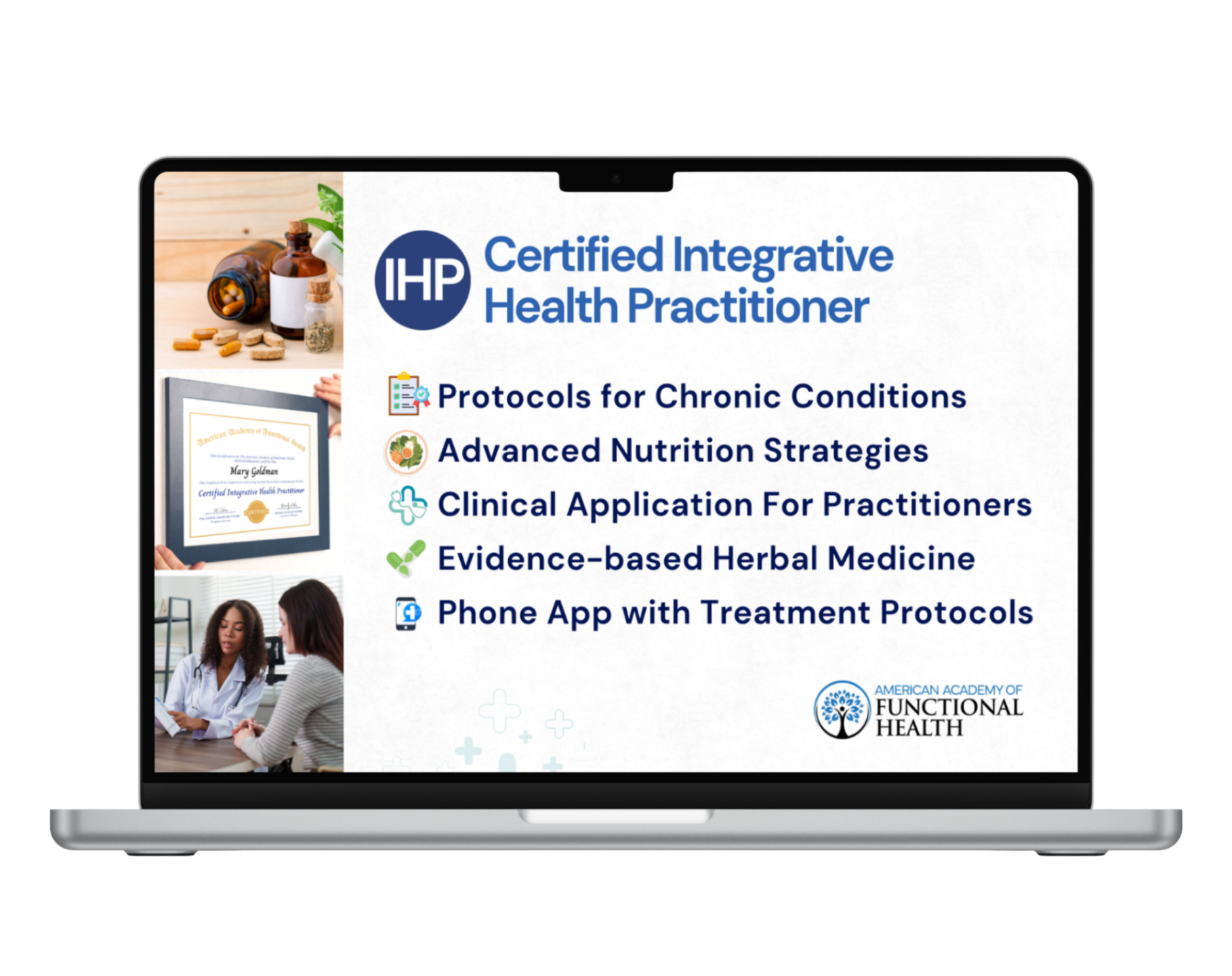Integrative Health Practitioner (IHP)
Certification
(100% Online, 10 Weeks, Live & On-demand Clinical Training)
The Hidden Connection Between Diet and Rheumatoid Arthritis
Rheumatoid arthritis (RA) is an autoimmune disease marked by chronic inflammation, joint pain, and reduced mobility. While genetics and environment play a role in its development, nutrition is a powerful and often overlooked factor in managing RA symptoms and reducing disease progression. This article explores the critical connections between sugar, food sensitivities, fatty acids, and vitamin D in the context of RA.
Sugar's Surprising Impact on RA and the Immune System
Research has demonstrated that sugar consumption can significantly impair immune function. Studies conducted at Loma Linda University showed that the effectiveness of white blood cells decreased by up to 50% within 1-2 hours of consuming sugar, with this immune suppression lasting up to five hours (Sanchez et al., 1973). The immune-suppressing effect of sugar begins less than thirty minutes after ingestion and may persist for approximately five hours, while complex carbohydrates show no such effect on immune function (Sears, 2023).
In a landmark study from the Nurses' Health Study, researchers followed 186,900 women and found that those who consumed more than one sugar-sweetened soda per day experienced a 63% increased risk of developing seropositive rheumatoid arthritis compared to those who rarely consumed sugary beverages (Hu et al., 2014). Notably, no such effect was found with diet sodas, indicating a specific issue with sugar, possibly including high fructose corn syrup, and its role in immune dysregulation and inflammation.
Food Sensitivities and RA: What You Eat Can Trigger Flares
Many RA patients experience symptom relief while fasting—a clue that certain foods may be driving inflammation. Studies have confirmed that individuals with RA often have heightened IgG, IgA, and IgE antibodies to dietary antigens, including cow's milk, wheat (gluten), chicken eggs, codfish, and pork (Kjeldsen-Kragh et al., 1991). These immune responses were found not only in the bloodstream but also in the jejunal fluid of the small intestine, highlighting the gut's role in systemic inflammation. Identifying individual food sensitivities through testing or elimination diets can significantly reduce flare-ups and promote healing.
Omega-3 vs. Omega-6: Striking the Right Balance to Reduce Inflammation
The modern Western diet is heavily skewed toward omega-6 fatty acids, often with a ratio of 15:1 or higher, compared to the ideal evolutionary balance of 1:1. This imbalance is a key contributor to chronic inflammation and conditions like RA (Simopoulos, 2002).
Omega-6 Sources:
- Safflower, sunflower, corn, and soybean oils
- Walnuts, pumpkin seeds
- Grain-fed meats (fed corn and soy)
Omega-3 Sources:
- Fatty fish (salmon, mackerel, herring)
- Fish oil supplements
- Flax seeds, chia seeds, walnuts
- Grass-fed meat and dairy
In patients with RA, research shows that reducing the omega-6 to omega-3 ratio to 2:1 or 3:1 can suppress inflammation and improve outcomes (Calder, 2006). Monitoring the omega-3 index, a blood test that reflects the balance of fatty acids, can help guide dietary adjustments. The target range is 8% or higher for optimal anti-inflammatory effects.
Caution with Nuts: Know Your Ratios
While nuts are often promoted as healthy snacks, many are high in omega-6. Here's a breakdown of common nuts and their omega-6 to omega-3 ratios:
- Walnuts – 4.2:1 (Good balance)
- Macadamia nuts – 6.6:1
- Cashews – 47:1
- Almonds – 278:1
- Peanuts – 1720:1 (Very high omega-6)
Choosing nuts with lower omega-6 ratios helps keep systemic inflammation in check.
Vitamin D and Rheumatoid Arthritis: More Than Just Bone Health
Vitamin D plays a critical immunomodulatory role in autoimmune conditions like RA. Research has consistently shown that vitamin D deficiency is highly prevalent in patients with RA and may be linked to disease severity (Cutolo et al., 2006). Studies have found that RA patients with vitamin D deficiency show increased disease activity and higher levels of inflammatory markers such as C-reactive protein (CRP) and erythrocyte sedimentation rate (ESR) (Welsh et al., 2011).
A systematic review and meta-analysis demonstrated that vitamin D supplementation in RA patients resulted in significant improvements in Disease Activity Score-28 (DAS-28), CRP levels, ESR, and serum vitamin D levels (Dehghan et al., 2024).
Vitamin D supports immune balance by:
- Regulating T-cell response and modulating CD4+ T cell phenotype
- Promoting tolerogenic regulatory T cells while suppressing pro-inflammatory Th1 and Th17 cells
- Inhibiting antigen presentation and the autoimmune cascade (Cutolo, 2019)
For RA patients, vitamin D supplementation is often necessary, and testing magnesium levels is crucial—since up to 50% of Americans are magnesium-deficient, which can prevent vitamin D from becoming active in the body.
Final Thoughts: Take an Integrative Medicine Approach to RA
RA is not just about joints—it's a systemic, inflammatory, and often nutrition-driven disease. Integrative medicine practitioners should consider:
- Sugar reduction to prevent immune suppression
- Elimination diets and food sensitivity testing
- Balancing omega-6 and omega-3 fatty acids
- Vitamin D and magnesium optimization
A personalized approach rooted in nutrition, gut health, and inflammation control can dramatically improve quality of life and slow the progression of RA.
References
Calder, P. C. (2006). n-3 polyunsaturated fatty acids, inflammation, and inflammatory diseases. The American Journal of Clinical Nutrition, 83(6), 1505S-1519S.
Cutolo, M. (2019). Vitamin D, autoimmune disease and rheumatoid arthritis. Calcified Tissue International, 106(1), 58-75.
Cutolo, M., Otsa, K., Uprus, M., Paolino, S., & Seriolo, B. (2006). Vitamin D in rheumatoid arthritis. Autoimmunity Reviews, 7(1), 59-64.
Dehghan, A., Rahimi, R., & Ghorbani, A. (2024). Effects of vitamin D supplementation in patients with rheumatoid arthritis: A systematic review and meta-analysis. Heliyon, 11(1), e40813.
Hu, Y., Costenbader, K. H., Gao, X., Al-Daabil, M., Sparks, J. A., Solomon, D. H., ... & Karlson, E. W. (2014). Sugar-sweetened soda consumption and risk of developing rheumatoid arthritis in women. The American Journal of Clinical Nutrition, 100(3), 959-967.
Kjeldsen-Kragh, J., Haugen, M., Borchgrevink, C. F., Laerum, E., Eek, M., Mowinkel, P., ... & Førre, Ø. (1991). Controlled trial of fasting and one-year vegetarian diet in rheumatoid arthritis. The Lancet, 338(8772), 899-902.
Sanchez, A., Reeser, J. L., Lau, H. S., Yahiku, P. Y., Willard, R. E., McMillan, P. J., ... & Register, U. D. (1973). Role of sugars in human neutrophilic phagocytosis. The American Journal of Clinical Nutrition, 26(11), 1180-1184.
Sears, W. (2023). Harmful effects of excess sugar. Ask Dr. Sears. Retrieved from https://www.askdrsears.com/topics/feeding-eating/family-nutrition/sugar/harmful-effects-excess-sugar/
Simopoulos, A. P. (2002). The importance of the ratio of omega-6/omega-3 essential fatty acids. Biomedicine & Pharmacotherapy, 56(8), 365-379.
Welsh, P., Peters, M. J., McInnes, I. B., Lems, W. F., Lips, P., McKellar, G., ... & Sattar, N. (2011). Vitamin D deficiency is common in patients with RA and linked to disease activity, but circulating levels are unaffected by anti-TNF treatment: results from a prospective cohort study. Annals of the Rheumatic Diseases, 70(6), 1165-1167.

What healthcare practitioners are saying about our classes:
A 10-Week Certification Program That Includes...

PROTOCOLS FOR CHRONIC DISEASES & SYMPTOMS
Evidence-Based Nutritional and Herbal Compounds that are simple and affordable and can support relief from chronic conditions and symptoms.

FOOD AS MEDICINE
How to Use Dietary and Lifestyle Medicine as Clinical Interventions to help your patients improve their health and function using dietary patterns, physical activity, sleep optimization, and stress resilience techniques.

MASTER PRECISION MEDICINE
Creating a Personalized Treatment Plan For Patients with Cardiovascular, Gastrointestinal, Musculoskeletal, and Autoimmune Conditions

DON'T FORGET HEALTH OPTIMIZATION
Special Training on Healthy Metabolism, Body Weight, and Women's Health at Different Stages of Life with Integrative Medicine

INTEGRATIVE MEDICINE FOR YOUNG PATIENTS
Learn Integrative (drug-free) Treatment Protocols for Common Pediatric Conditions (including flu, ear infections, Sore throat, UTI, Hand, foot & Mouth, Pink eye, and supporting healthy immune function)

✔ Get 24/7 Access to All Classes
✔ Weekly Live Class to Advance Your Skills
✔ Get Certified in 10 Weeks
✔ Bonus Package Included (see below)

BONUS #1 EASY & FAST ACCESS TO ALL YOUR PROTOCOLS
Access to a Unique Phone App with Treatment Protocols for Hundreds of Chronic Adult & Pediatric Conditions
(3-Year Access Included as a gift)

BONUS #2 INTEGRATIVE MEDICINE CLINICAL GUIDE
A Clinician's Guide To Applying Clinical Nutrition & Herbal Medicine.

BONUS #3 WATCH & REVIEW AGAIN ANYTIME
Access to all the recorded classes and case studies for 12 months

Clinical Tools, Treatment Frameworks, and Real-world Strategies
10-Week Curriculum Overview
Week 1: Clinical Foundation & Food As Medicine
- Explore in depth the foundations of health, wellness, and restoration of function through an integrative framework that combines clinical nutrition, botanical medicine, lifestyle strategies, and mind-body approaches.
- Learn how these modalities work together to prevent and address chronic disease while supporting resilience and vitality.
Week 2: Cardiovascular Health
- Gain practical tools for the prevention and integrative management of hypertension, dyslipidemia, coronary artery disease, and heart failure.
- Review evidence-based nutrition, botanicals, and lifestyle interventions that promote vascular health and post-stroke recovery.
Week 3: Metabolic Health, Diabetes & Kidney Function
- Learn specific protocols for patients with insulin resistance, diabetes, obesity, and chronic kidney disease.
- A special class on Functional Blood Chemistry shows how to apply targeted nutritional and botanical strategies to restore abnormal cardiometabolic, kidney, and lipid biomarkers.
Week 4: Gastrointestinal Disorders
- Learn specific protocols for patients with GERD, IBS, constipation, diarrhea, ulcers, and fatty liver disease.
- Discuss key concepts in malabsorption and digestive dysfunction, including low stomach acid, pancreatic and bile insufficiency, and explore therapeutic strategies to support digestion, nutrient absorption, and microbiome balance.
Week 5: Thyroid & Women’s Hormonal Health
- Explore integrative approaches to hypothyroidism, PMS, PCOS, perimenopause, and menopause.
- Understand how nutrition, stress, circadian rhythm, and endocrine-disrupting exposures influence hormonal balance—and how to restore it using adaptogenic herbs and lifestyle medicine.
Week 6: Chronic Pain & Musculoskeletal Health
- Gain practical tools to address chronic joint pain, osteoarthritis, fibromyalgia, muscle pain, and neuropathy through a whole-person, integrative approach.
- Learn nutritional and botanical therapies for inflammation modulation, mitochondrial support, and joint restoration.
Week 7: Immune Balance & Autoimmune Conditions
- Learn strategies for supporting healthy immune function and understanding the impact of diet and lifestyle on immune dysregulation (e.g., IL-6 vs. IL-10).
- Explore approaches for restoring immune balance in post-COVID patients and review treatment protocols for autoimmune conditions, including rheumatoid arthritis, psoriasis / psoriatic arthritis, lupus, and multiple sclerosis (MS).
Week 8: Mental Health & Mood Disorders
- Take an integrative approach to depression, anxiety, PTSD, and postpartum mood disorders.
- Discover nutritional psychiatry, botanicals for mood and sleep, and lifestyle strategies that promote neurotransmitter balance and emotional resilience.
Week 9: Healthy Aging & Geriatric Health
- Explore the physiology of aging and evidence-based approaches to preserve vitality.
- Learn practical interventions for cognitive decline, dementia, osteoporosis, and sarcopenia, focusing on nutrition, movement, and hormonal support for longevity and quality of life.
Week 10: Food as Medicine & Integrative Management Strategies
- Apply everything you’ve learned through real-world case studies and clinical frameworks.
- Explore natural solutions for hormonal imbalances, the use of peptide therapy, and practical steps for growing a successful Integrative Medicine practice.
- Review an Integrative Medicine flow model—from dietary and lifestyle assessment to social support and readiness for change—using a simple structure of one dietary, one lifestyle, and three supplement recommendations, followed by a strategic follow-up plan.
- Cover the clinical application, pros, and cons of the most common diets, including when each approach may be indicated or contraindicated based on patient presentation and physiology.
Program Cost: $4,500
Healthcare provider scholarship includes a discount of $2,100!
Bringing the price to just $2,400
Apply For Program + Scholarship
-
You want multiple treatment options—like herbal and nutritional supplements— to support patients with chronic pain, cardiometabolic, autoimmune, women's health, geriatric, and mood disorders.
-
You want evidence-based dietary and lifestyle recommendations that complement medications and create real results—without guesswork or endless theory.
-
You want to become the go-to practitioner in your community who attracts committed patients and builds a thriving practice while learning at your own pace.
Presenters with Years of Clinical Experience

Dr. Asia Muhammad, ND
Dr. Asia Muhammad, ND, is a board-certified Naturopathic Doctor dedicated to bridging science and natural medicine. She earned her Bachelor’s degree in Chemistry and Biology from Middle Tennessee State University and her Doctorate of Naturopathic Medicine from Southwest College of Naturopathic Medicine and Health Sciences (SCNM) in Tempe, Arizona—an accredited medical institution that integrates both naturopathic and conventional medical approaches to healing.
After graduating in 2014, Dr. Asia completed a two-year residency in Integrative Medicine in Arizona, where she gained extensive experience in the evaluation and treatment of chronic diseases. Since then, she has continued her work in private practice, providing personalized, evidence-based care to support long-term wellness.
Her work has been published in leading journals, including Integrative Medicine: A Clinician’s Journal and the Journal of Natural Medicine. She also co-hosted the Amazon Prime award-winning docuseries The Art of Natural Healing, highlighting the power of evidence-based natural therapies.
Dr. Asia integrates clinical nutrition, botanical medicine, and lifestyle interventions to create individualized treatment plans tailored to each patient’s unique needs. A passionate advocate for Integrative Health, she empowers her patients to take an active role in prevention, healing, and sustainable self-care.

Dr. Matthew Cavaiola, ND, MS
Dr. Matthew Cavaiola is a naturopathic physician with 17 years of clinical experience in Functional, nutritional, and herbal medicine. He specializes in cardiometabolic conditions, detoxification, and men’s health.
He received a Bachelor’s Degree in Biology and a Master’s Degree in Human Nutrition from the University of Delaware, a Master's Degree in Acupuncture, and a Doctorate Degree in Naturopathic Medicine. He has been practicing as a Functional and integrative medicine physician for 17 years and was also an adjunct professor at the Sonoran University of Health Sciences and Bastyr University.

Tal Cohen, DAOM, MS
Tal Cohen, DAOM, MS-HNFM is an author and presenter with over 16 years of clinical experience with integrative, nutritional, and Eastern and Western herbal medicine.
He developed multiple Functional and Nutritional medicine programs, lectured nationwide, and is the author of several books and patient guides, including “Treating Pain and Inflammation with Functional Medicine: The Complete Clinical Guide” and “The Complete Guide to Removing Toxins & Improving Your Health.”
Tal completed a Master of Science in Human Nutrition and Functional Medicine and a Doctorate in Acupuncture and Oriental Medicine.

Dr. Chil Khakham, ND, MBA
Dr. Chil is a naturopathic physician with additional training in Functional Medicine, functional endocrinology, and functional blood chemistry.
His education includes a Bachelor of Science, a Master of Business Administration, and a Doctorate in Naturopathic Medicine.
Dr. Chil developed several Functional medicine programs and established and developed several successful brick-and-mortar and virtual practices.

Jessica Knese, MS, CNS
Jess graduated from the University of Colorado with a dual bachelor's degree in Integrative Physiology and Psychology and a Master's of Science in Clinical Nutrition and Integrative Health from Maryland University of Integrative Health. Jess is also a Certified Nutrition Specialist and has been working in several Functional and integrative medicine clinics with primary care providers who implement nutrition into their practice.
The Integrative Health Practitioner Certification Program
December 1st 2025

00
DAYS
00
HOURS
00
MINS
00
SECS
A COMPREHENSIVE PACKAGE
What's Included in the Program...
Register now and receive our comprehensive package and bonuses:
✅ Live Weekly Classes + Recordings — Engage in live training sessions and access all recordings anytime.
✅ Treatment Protocols for Common Conditions — Covering cardiovascular, metabolic, gastrointestinal, endocrine, musculoskeletal, immune, mental health, women's, and geriatric conditions, using evidence-based nutritional, botanical, and lifestyle medicine.
✅ Downloadable PDF Handouts for every class.
✅ Clinical Guides & Patient Resources to apply what you learn in practice.
✅ Private Member Portal with one-year access to all course materials and recordings.
✅ Printable Grocery Lists aligned with recommended nutritional protocols.
✅ Healthy Cooking eBook (Branded for Your Clinic) featuring simple, evidence-based recipes for patient support.
✅ Functional Medicine Phone App (1-Year PRO Access) — Instant access to protocols for hundreds of chronic conditions.
✅ Nursing Continuing Education (20 CEs) — Accepted in 46 out of 50 U.S. states.
✅ Printed Certification of Completion to showcase your new credentials.
✅ Lifetime Listing in Our Providers’ Directory to enhance your professional visibility.
✅Dedicated Phone app with treatment protocols for hundreds of adult and pediatric conditions
Program Cost: $4,500
Healthcare provider scholarship includes a discount of $2,100!
Bringing the price to just $2,400
Apply For Program + ScholarshipFrequently Asked Questions
Who can register to this program?
How long does it takes to get certified?
Why should I register for this program?
What if I cannot attend the 1hr live class every week?
Will I learn about the treatment protocols?
Who is the creator of the Integrative Health Practitioner Program?
I have additional questions. Who can I contact?
Apply For Program + Medical Scholarship
Schedule a short call with an academic advisor
The Integrative Health Practitioner
Certification Program
Starting December 1st 2025

00
DAYS
00
HOURS
00
MINS
00
SECS
